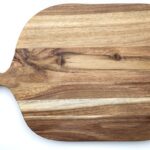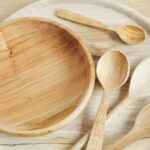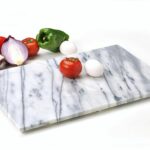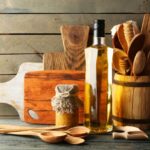Bamboo chopping boards have become very popular recently. This is due to their modern, natural look and affordable price. In addition, bamboo is a sustainable material that meets the expectations of environmentally conscious customers.
However, before purchasing, it is important to be aware of the negative aspects of bamboo cutting boards. These boards are not dishwasher safe and need to be oiled to stay in good condition. When exposed to water, bamboo boards can split, warp, or fall apart.
For most people, the biggest downside to bamboo boards is that they can be damaging to kitchen knives.
While cutting boards made of hard material are more resistant to damage from knife blades, your knives may become blunt when cutting on them. Since a bamboo cutting board is quite inexpensive, you can replace it without much effort. However, you probably aren’t willing to give up the sharpness of your favorite kitchen knives.
Sharp knives make cutting work easier and reduce the risk of injury. Using a dull knife requires more force, which increases the risk of injury.
Why are bamboo cutting boards brutal to your knife edges?
Cutting surfaces made of hard material tend to dull knife blades. Bamboo is a material with great strength and hardness. It is harder than hardwoods like oak and maple. The main reason for bamboo’s hardness is its high silica content.
Several other factors can contribute to the unwanted dulling of knife blades.
If the board has a lot of bamboo knots, this can cause more wear and tear on kitchen knives because these knots are harder than the smooth areas of the board surface.
Bamboo vs. Wood Cutting Board
- Bamboo is harder and less porous than wood. It can withstand heavy chopping and requires oiling less often than wood.
- Bamboo outperforms wood when it comes to sustainability. Bamboo is one of the fastest growing plants, while some hardwoods like maple take decades to mature
- Bamboo cutting boards are cheaper because bamboo is a fast-growing grass that is easier to access than wood.
- Bamboo cutting boards are lighter and easier to lift and carry. Wooden boards are heavier, but more stable when cutting.
- Finally, most wood materials are more knife-friendly than bamboo.
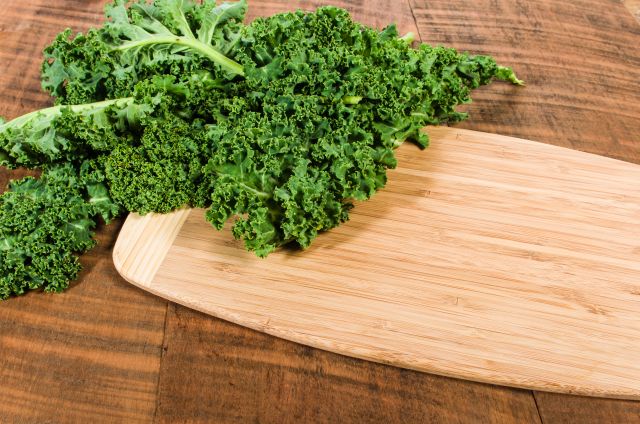
Are bamboo cutting boards safe for cutting food?
From a food safety perspective, bamboo cutting boards are a good option. You don’t have to worry about plastic particles in your food, and bamboo is less susceptible to bacteria than plastic.
Purchase this product from a reputable company to ensure that the glue used to hold the bamboo pieces together is non-toxic and FDA-approved for indirect food contact.
This post contains links to Amazon. The publisher may get paid if You purchase something through the links without additional costs to You.
What are the best and worst cutting boards for knife blades?
Any cutting surface that is harder than the blade of your knife will dull your cutlery. If you want to keep your knives sharp, the best choice is hardwood with an end-grain cutting surface. Using a sharp knife will leave marks on the wood surface, but the blade will not roll over. Walnut, maple, and cherry are good choices.
A high-quality plastic board is also a good choice for knife blades. An added benefit is that you can simply put them in the dishwasher and they come out clean and disinfected.
The worst boards for your knives are glass, stone, and ceramic cutting boards.
How to minimize knife dulling when using a bamboo chopping board?
To minimize the dulling effect, choose a board with an end-grain look. End-grain bamboo cutting boards protect knife edges better than flat and vertical grain boards but are also more expensive and need to be oiled more often. When you cut on an end grain board, the knife blade cuts between the natural separations of the bamboo fibers, keeping the knives sharp longer.
With proper cutting techniques, you can maintain the sharpness of your knives on any cutting board. To protect the knife blades, you should avoid chopping with excessive pressure and cutting against the grain. Instead, opt for a finer chopping technique and cutting motion.
Choose a board with a perfectly smooth surface, without burrs and splinters. Avoid very cheap boards from unknown suppliers as they may contain low-quality glue.
Excessive use of a bamboo cutting board is not recommended. However, it won’t harm your knives if you use them for serving cheese or cutting soft fruits and vegetables. A bamboo board is a stylish serving tray for your guests.
While knife-friendliness is a clear consideration, the natural elegance, low environmental impact, and overall functionality make a bamboo cutting board a worthy addition to your cooking gear.
